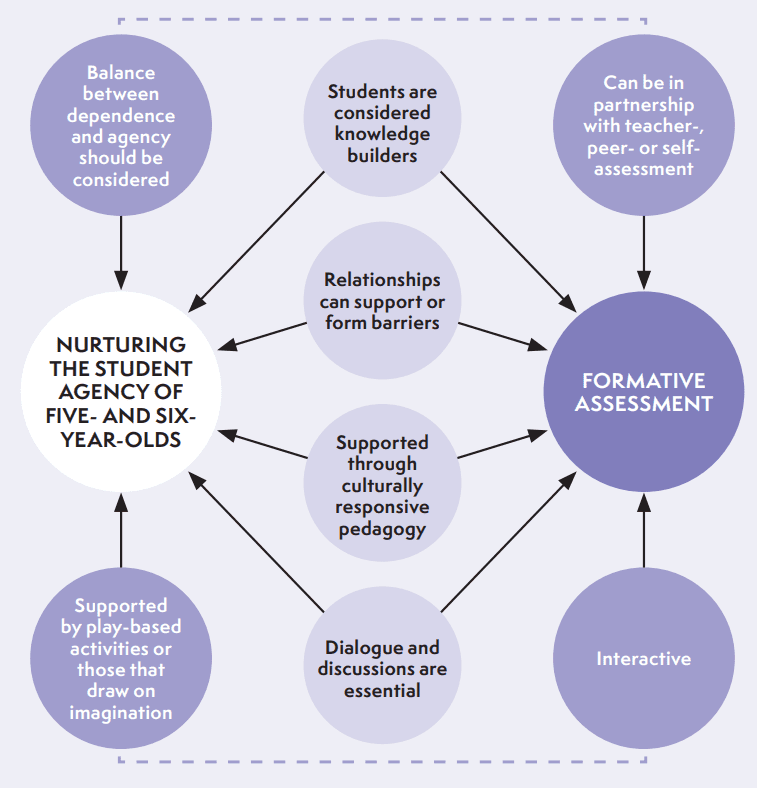Bev Coombridge, Doctoral Student, University of Buckingham, UK; Initial Teacher Educator, Bethlehem Tertiary Institute, New Zealand
The development of student agency is increasingly recognised as a crucial element in effective education (Sirkko et al., 2019; Cook-Sather, 2020; Ruef, 2021), particularly in the formative years of primary school (Vaughn, 2018). Research has consistently shown that formative assessment can significantly impact children’s learning (Black and Wiliam, 2006; Dann, 2014). Despite a robust body of research on formative assessment and a growing interest in student agency, a notable gap exists in understanding how specific assessment methods, such as co-constructing an assessment context, affect student agency. This is especially true for children in their first two years of primary school. To address this gap, a doctoral research project was initiated to explore how student agency can be fostered through co-constructed formative assessment in classrooms of five- to seven-year-old children. The initial stage, a comprehensive literature review, revealed several common themes in student agency and formative assessment research. These insights have led to the development of a framework to help teachers to reflect on how their assessment practices can nurture student agency. This article provides an overview of the key points from the literature review. It introduces the framework that can guide teachers in creating assessments that support the development of student agency.
Defining student agency in primary education
Student agency in primary-aged children is a complex concept, encompassing individual capacity, environmental context and interactions between children and adults (Oswell, 2013). Drawing on Albert Bandura’s (1986) social cognitive theory, the OECD’s (2019) definition of student agency and the Vaughn et al. (2020) agency model, a nuanced understanding of student agency in the primary school classroom can be gained. Bandura’s (1986) theory emphasises self-efficacy, intentionality, forethought, self-reactivity and self-reflection, all crucial in shaping behaviour and learning. In a primary education context, these elements translate into students’ abilities to set goals, strategise, anticipate outcomes, regulate their actions and reflect on their learning.
The OECD (2019) definition highlights the student’s ability to act responsibly and effect change, aligning with Bandura’s view of agency as a means with which to influence life quality. Vaughn et al.’s (2020) model adds layers of intentionality, self-perception, persistence, choice-making and interaction, and is particularly relevant for young learners. Therefore, in primary education, student agency could be defined as a dynamic interplay between the child’s evolving capacity to influence their learning and the supportive, nurturing role of educators and the learning environment. This involves recognising the children’s dependence on adults whilst fostering their ability to make choices, express ideas and engage interactively in their learning process. This balance of dependence and agency is a foundational factor in developing formative assessments that nurture agency in the classroom.
A practical example of fostering student agency could be a classroom project where students choose the topic based on their interests, plan the project with teacher guidance and reflect on their learning outcomes. This approach embodies Bandura’s concepts of intentionality and forethought, along with Vaughn et al.’s emphasis on choice-making and self-perception, all within a framework that respects the child’s developmental stage and dependency. However, it can be challenging to offer such choices in curriculum-cramped environments, where specific knowledge is legislated at certain ages. An assessment strategy that I have found effective involves students co-designing the assessment context while the teacher retains control over content and progression. This method transforms assessment from an evaluation of learning to a tool for learning.
Dominant themes in student agency research
The literature review on student agency identified four main themes: cultural frameworks, peer and teacher relationships, environmental factors and student self-perception. Each plays a distinct yet interconnected role in nurturing student agency. Digging deeper into the four themes, common principles reoccurred within each and are echoed in the literature on the effective use of formative assessment.
Figure 1 illustrates how the four key principles drawn from literature are central to a framework for enhancing student agency through formative assessment:
- Students as knowledge-builders: This principle, highlighted by authors including Sirkko et al. (2019) and Carlone et al. (2021), emphasises designing assessments that enable students to explore and construct knowledge based on their unique interests and experiences.
- Positive classroom relationships: As noted by Riley (2019), Mameli et al. (2020) and Moses et al. (2020), fostering a supportive environment is crucial. Assessments should encourage collaboration and acknowledge the significance of parental and community involvement.
- Culturally responsive pedagogy: Advocated by authors including Bishop and Berryman (2010) and McQueen (2022), this approach integrates students’ cultural contexts into classroom activities and assessments, thereby reinforcing their agency.
- Dialogue and discussion: Research from González-Howard and McNeill (2020) and Ruef (2021) underscores the fact that meaningful conversations promote agency. Oral assessments and group discussions are practical ways in which to implement this principle.
These principles form the core of the diagram, underscoring their centrality in nurturing student agency through assessment.

Figure 1: A framework of principles for nurturing student agency through formative assessment
Two further principles were identified by making links between the nature of formative assessment practices and considerations for nurturing student agency in the primary classroom. Firstly, a connection is made between the interactive nature of formative assessment (Allal, 2021) and the interactive nature of play-based imaginative pedagogies (Dyson, 2020; Sairanen et al., 2022) to add the fifth principle outlined below. Secondly, a link is drawn between the balance of agency and dependence for younger children (Oswell, 2013) and the idea that formative assessment can be in partnership with educators or peers, to give the sixth principle in the framework.
- Interactive, creative play-like techniques: Using play and creativity in assessments allows children to express themselves naturally and enjoyably.
- Balancing agency and dependence: It’s essential to guide students while allowing them independent exploration.
A practical application: Co-constructing assessment
As noted earlier, an assessment strategy that I have found effective across various educational settings is co-constructing the assessment context with students. The model of assessment design outlined below considers the principles identified in the framework that nurture student agency, whilst leaving the decisions about content, learning objectives and sequence to the teacher. Teachers bring knowledge of what needs to be assessed, and students bring their own experiences, imagination, creativity and culture.
1. Class meeting
Initially, the teacher and students meet to discuss ideas for how learning can be shown. Beginning the assessment process in this way empowers students as knowledge-builders and active participants in their learning. This practice builds positive classroom relationships, creating a nurturing and collaborative environment where students feel supported and heard. Such an inclusive setting is also conducive to culturally responsive pedagogy, as it integrates students’ diverse cultural narratives into learning activities.
The meeting serves as a platform for meaningful dialogue and discussion. While students are encouraged to participate and contribute, the teacher provides the necessary structure and support to ensure that educational goals are central and that learning is effective. This balance of agency and dependence is critical to fostering both independence and a sense of community within the classroom.
2. Make a plan
Following the initial meeting, the students and teacher decide on a context for showcasing their learning. The teacher contributes to the discussion and encourages students to consider authentic ways in which the learning is used in the local community.
By exploring and sharing how their learning is utilised in the community, students are not just passive recipients of knowledge but active co-constructors, applying what they learn to real-life contexts. This method also aligns with culturally responsive pedagogy.
3. Work together
The teacher then facilitates the project or idea that has been agreed on by providing regular small chunks of classroom time for students to work towards the end project. By working together towards a common goal, students actively explore, discuss and build new understandings based on their interests and experiences. This collaborative effort is a form of experiential learning, whereby students apply what they have learned in a practical, real-world context, thereby deepening their comprehension and skills. This also encourages dialogue and discussion, which is vital for enhancing student agency and developing critical thinking and communication skills. The nature of the project allows for interactive, creative, play-like techniques, offering students an enjoyable and expressive way in which to demonstrate their learning. While students are given the autonomy to plan and execute their projects, the teacher’s ongoing facilitation and structured classroom time ensure that students remain guided and focused on their educational objectives, providing a harmonious blend of independence and support.
4. Showtime
Students run the end project, with the teacher taking on an observation role. It is often appropriate for the students to share the end project with the broader learning community.
This phase culminates in students’ exploration, creativity and application of knowledge. Having taken ownership of their learning journey, students can now share and teach others, effectively consolidating their understanding and skills. Additionally, presenting the project to the broader learning community amplifies the principles of building positive classroom relationships and culturally responsive pedagogy. The presentation format can incorporate interactive, creative elements, aligning with play-like techniques that allow students to express their learning in enjoyable and innovative ways. This stage represents a changed balance between agency and dependence. The teacher’s role as an observer signifies a shift towards greater student independence. Yet the guidance and support provided throughout the project ensures that students are well-prepared and confident in this more autonomous role.
5. Review and reflect
The final step in the process follows the showcasing of learning closely, when the students and teacher meet to review the learning and consider whether the learning objectives were met.
The educational principles are consolidated and reflected upon in the final step of reviewing the learning and assessing whether objectives were met. This review process epitomises the concept of students as knowledge-builders. It’s an opportunity for students to reflect on their learning journey, understand the depth and breadth of their acquired knowledge, and recognise how their interests and experiences shaped their learning.
Conclusion
In conclusion, nurturing student agency in young learners through assessment is a multifaceted and dynamic process. It requires teachers to consider cultural backgrounds, build positive relationships, engage in dialogue, use creative techniques, balance guidance and independence, and view students as knowledge-builders. This approach ensures that assessments are not just a measure of learning but a meaningful part of the learning journey towards a positive, agency-rich assessment environment.











